Pierre Toussaint. Autograph Letter Signed. To “most charitable lady”, Madame [Mary Anne Sawyer] Schuyler, Albany. 3pp.+ address leaf. French text. Toussaint, a slave from Haiti, became the favored French hairdresser to the high society matrons of New York. A devout Catholic and philanthropist, he was beatified and proposed for canonization in the 1990s as the first African-American male Saint. Toussaint’s letters are extremely rare – the only five known are held by the New York Public Library. None have appeared at auction, though Toussaint’s last will and testament was sold in New York in 2007 for $8000. Born into slavery in French Haiti in 1766, Toussaint had been taught to read and write by his master, a religious Catholic, who immigrated to New York after the Revolution. His talent as a hair stylist, as well as his intelligence, charm and sympathetic discretion, made him the trusted confidante of the city’s female elite, notably including Elizabeth Schuyler - Mrs. Alexander Hamilton - and her sister-in-law, Mary Anne Sawyer Schuyler. When Toussaint’s master died, leaving his widow destitute, Toussaint became her majordomo and sole financial support; upon her death, emancipated, he took the surname of the Haitian revolutionary hero. He then devoted much of his time and income to giving shelter to Black orphans, and helping to found a Catholic orphanage; he also nursed the sick during cholera epidemics. When Toussaint died in 1853, a year after Mrs. Schuyler, his funeral was attended by a thousand New Yorkers, white and Black, rich and poor. Her sons were executors of his estate and her sister then wrote his first biography. Curiously, about the time of his death, a grown Catharine Schuyler Jones – whose birth he noted in this letter - became a Catholic nun, over the fervent objections of her Protestant family, and founded a home for “friendless” girls. In this very rare letter of playful social chit-chat to his dearest friend, sister-in-law of Alexander Hamilton’s widow, he “rejoices” that her step-daughter, wife of the Chancellor of New York, had just been “happily delivered” of a baby girl, “whom I salute with all my heart”, and jokes, “Toussaint counts upon dressing her hair some 16 years hence, God willing.” He had been visited by Mrs. Schuyler’s “amiable and charming” son William, who had given him a “beautiful ring”, presented in a gracious manner, which “I will never forget.” He had received a letter from “that good angel”, Mrs. Cruger, one of the wealthiest New York widows, who “I assure you…loves you very much, and…has good reason to do so.” He had apparently received an invitation to a party at the home of Mrs. Jay, socialite wife of Founding Father John Jay (first Chief Justice of the United States and George Washington’s first Secretary of State), knowing that Mrs. Schuyler had also been invited. He “sends compliments” from the widow of a French émigré whose private boarding school was attended by the children of the New York upper crust (as well as the sons of Henry Clay) and also sends “many respectful messages” from his own wife and adopted daughter, who were also freed slaves. Rough Translation of the Letter: Most charitable lady, I received your letter with the greatest pleasure in the world, and am rejoiced that Mrs. Jones is happily delivered. I beg of you to present to her my respectful compliments and say to her that I do not forget her charming children, especially the late arrival whom I salute with all my heart. Please to tell it, that Toussaint counts upon dressing her hair some 16 years hence, God willing - I received a visit yesterday evening which truly gave me the greatest pleasure. I need not tell you from whom, I leave it for you to guess.----Yes, you have guessed rightly; it was he himself; that good amiable and charming Mr. William came to see me, and bring me a beautiful ring, and you may well suppose that it did not make me feel bad, not so much for the ring, as for the manner i
Pierre Toussaint. Autograph Letter Signed. To “most charitable lady”, Madame [Mary Anne Sawyer] Schuyler, Albany. 3pp.+ address leaf. French text. Toussaint, a slave from Haiti, became the favored French hairdresser to the high society matrons of New York. A devout Catholic and philanthropist, he was beatified and proposed for canonization in the 1990s as the first African-American male Saint. Toussaint’s letters are extremely rare – the only five known are held by the New York Public Library. None have appeared at auction, though Toussaint’s last will and testament was sold in New York in 2007 for $8000. Born into slavery in French Haiti in 1766, Toussaint had been taught to read and write by his master, a religious Catholic, who immigrated to New York after the Revolution. His talent as a hair stylist, as well as his intelligence, charm and sympathetic discretion, made him the trusted confidante of the city’s female elite, notably including Elizabeth Schuyler - Mrs. Alexander Hamilton - and her sister-in-law, Mary Anne Sawyer Schuyler. When Toussaint’s master died, leaving his widow destitute, Toussaint became her majordomo and sole financial support; upon her death, emancipated, he took the surname of the Haitian revolutionary hero. He then devoted much of his time and income to giving shelter to Black orphans, and helping to found a Catholic orphanage; he also nursed the sick during cholera epidemics. When Toussaint died in 1853, a year after Mrs. Schuyler, his funeral was attended by a thousand New Yorkers, white and Black, rich and poor. Her sons were executors of his estate and her sister then wrote his first biography. Curiously, about the time of his death, a grown Catharine Schuyler Jones – whose birth he noted in this letter - became a Catholic nun, over the fervent objections of her Protestant family, and founded a home for “friendless” girls. In this very rare letter of playful social chit-chat to his dearest friend, sister-in-law of Alexander Hamilton’s widow, he “rejoices” that her step-daughter, wife of the Chancellor of New York, had just been “happily delivered” of a baby girl, “whom I salute with all my heart”, and jokes, “Toussaint counts upon dressing her hair some 16 years hence, God willing.” He had been visited by Mrs. Schuyler’s “amiable and charming” son William, who had given him a “beautiful ring”, presented in a gracious manner, which “I will never forget.” He had received a letter from “that good angel”, Mrs. Cruger, one of the wealthiest New York widows, who “I assure you…loves you very much, and…has good reason to do so.” He had apparently received an invitation to a party at the home of Mrs. Jay, socialite wife of Founding Father John Jay (first Chief Justice of the United States and George Washington’s first Secretary of State), knowing that Mrs. Schuyler had also been invited. He “sends compliments” from the widow of a French émigré whose private boarding school was attended by the children of the New York upper crust (as well as the sons of Henry Clay) and also sends “many respectful messages” from his own wife and adopted daughter, who were also freed slaves. Rough Translation of the Letter: Most charitable lady, I received your letter with the greatest pleasure in the world, and am rejoiced that Mrs. Jones is happily delivered. I beg of you to present to her my respectful compliments and say to her that I do not forget her charming children, especially the late arrival whom I salute with all my heart. Please to tell it, that Toussaint counts upon dressing her hair some 16 years hence, God willing - I received a visit yesterday evening which truly gave me the greatest pleasure. I need not tell you from whom, I leave it for you to guess.----Yes, you have guessed rightly; it was he himself; that good amiable and charming Mr. William came to see me, and bring me a beautiful ring, and you may well suppose that it did not make me feel bad, not so much for the ring, as for the manner i


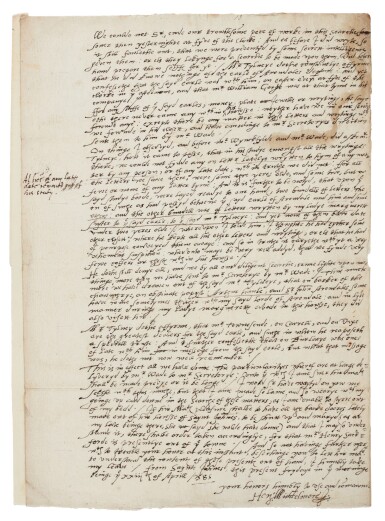



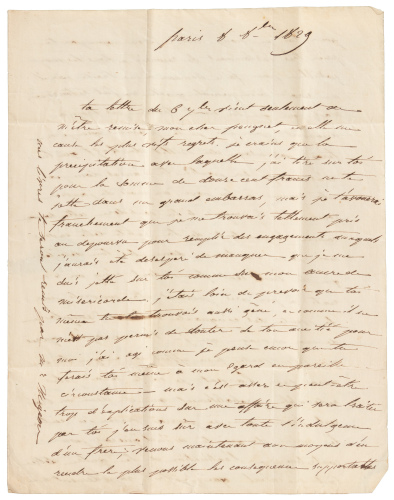
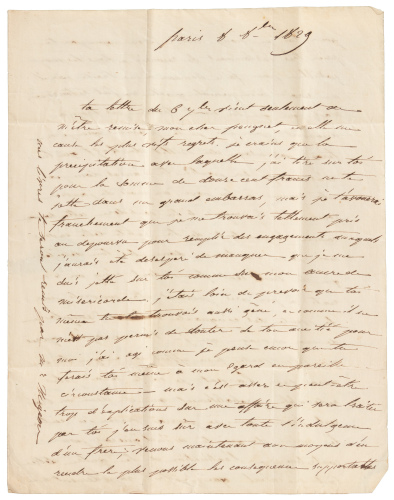
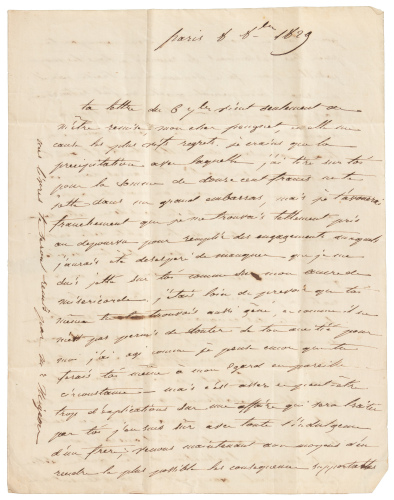



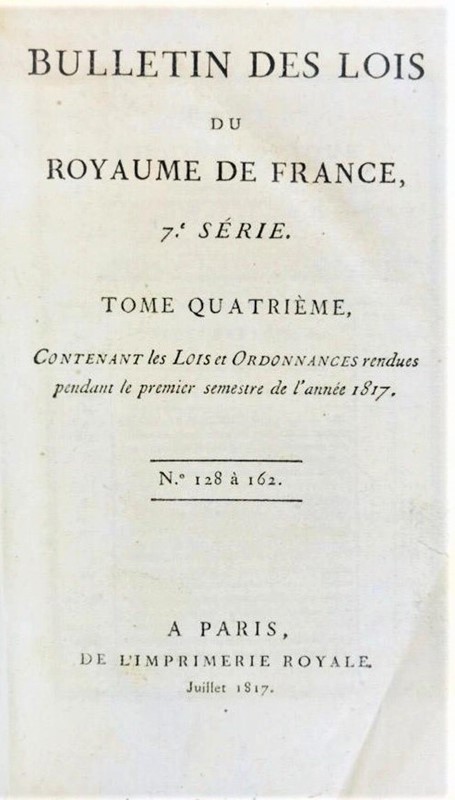

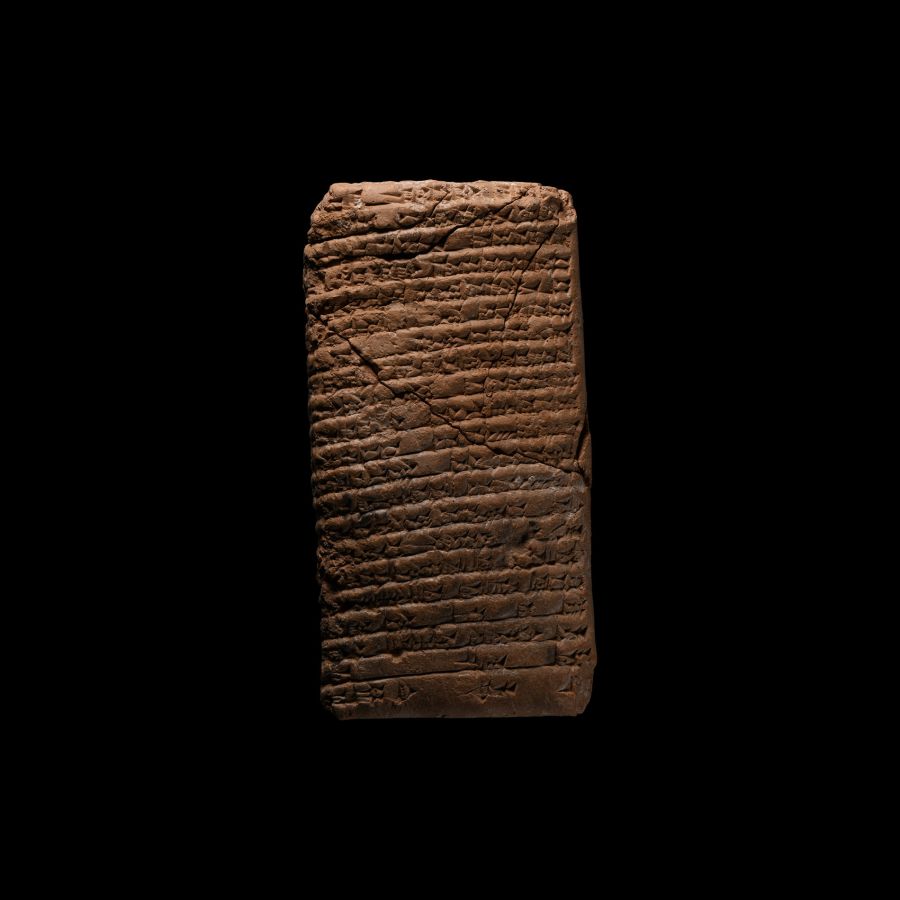
Testen Sie LotSearch und seine Premium-Features 7 Tage - ohne Kosten!
Lassen Sie sich automatisch über neue Objekte in kommenden Auktionen benachrichtigen.
Suchauftrag anlegen